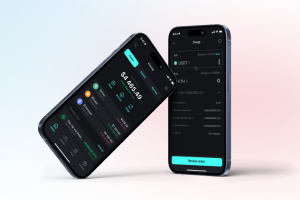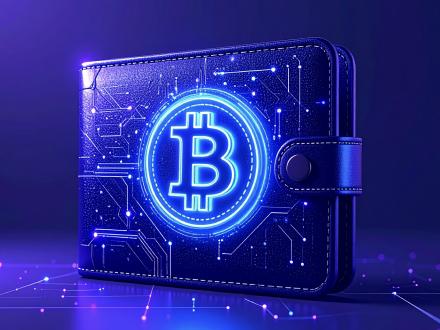Your message has been sent.
We’ll process your request and contact you back as soon as possible.
The form has been successfully submitted.
Please find further information in your mailbox.


Blockchain technology is a hot topic these days, particularly in the financial sector. Experts say the global blockchain market in banking and financial services could hit around $27.69 billion by 2028. This boom is largely thanks to blockchain’s ability to save money by eliminating the need for a middleman in transaction oversight. This means lower costs and faster processing times, which is great news for everyone.
A big deal in this space is also central bank digital currencies (CBDCs). These are digital versions of regular money, like dollars or euros, issued by central banks using blockchain. CBDCs offer the stability of traditional money with the efficiency of digital transactions, making them a more reliable option compared to the often-volatile cryptocurrencies.
Banks are jumping on the blockchain bandwagon not just to keep up with tech trends but to transform banking standards completely. Blockchain speeds up transactions and slashes costs, boosting customer satisfaction. Plus, CBDCs provide a modern, digital money solution that reaches people who typically don’t use traditional banking services. This isn’t just about staying up-to-date — it’s about redefining what banking can be.
The banking sector has been a cornerstone of a huge number of different economic activities — including lending, trading, transaction settlement, and payment processing — but it’s no secret that the industry is grappling with how to adapt to these swiftly-evolving advancements in tech. Even with the introduction of new technologies, many banking operations are still bogged down by paperwork, leading to inefficiencies that waste time and resources — and pose security risks.
Banks need rock-solid solutions to address these security concerns and bolster defenses against emerging cyber threats. Additionally, the need to monitor credit histories and manage risks calls for innovative strategies to handle bad debts and improve regulatory compliance. The stiff competition from the nimble FinTech industry — which has a track record of adapting quickly to digital changes — only adds to this pressures.
The solution lies in balancing traditional practices with innovation — and blockchain technology provides this balance. Both public and private blockchain architectures offer ways for banks to overhaul their systems — all while maintaining the trust and transparency essential to their foundational role in the financial ecosystem.
Bank smarter with blockchain: no breaches, just peace of mind
The versatility of this tech means there are a huge number of different blockchain applications in banking – each addressing a specific pain point. Let’s explore some of the most impactful ones.
One major opportunity for blockchain to shine is in international financial transactions, especially for cross-border payments. Traditionally, these payments involve multiple intermediaries like correspondent banks, as well as lengthy processing times and potential losses due to foreign currency exchange risks. Currently, billions of dollars are wasted due to extra fees and slow payment processes. For instance, sending money from New York to Tokyo can involve both the sending and receiving banks charging around $25 each as a flat fee.
These unnecessary charges can be eliminated with blockchain-based banking payments using cryptocurrencies like Ripple. Crypto payments are quick and straightforward — with no surprise transaction fees. If that wasn’t enough, blockchain decentralization means there’s no need for third-party verification, speeding up and reducing the cost of transfers.
Similarly, P2P payments have changed the way individuals transfer money — making it easy for users to send funds in just a few taps. All that’s needed is the recipient’s email address or phone number — meaning splitting bills with friends and family has never been simpler. Say you go out for dinner; you can pay your friend right back by selecting their name in your app, entering the amount, and hitting send.
Once your friend receives the money, they can either keep it in their P2P account or transfer it to their bank. With blockchain, this process is even better: it cuts out the middleman — bypassing traditional banking networks, cutting down on unwanted fees, and increasing security. This keeps hackers at bay and ensures that P2P payments are carried out fast and at minimal cost.
Moving on to something a bit more complicated: how blockchain is set to improve settlement and clearance processes, traditionally riddled with inefficiencies. Right now, banks are stuck with a messy web of intermediaries and manual processes, leading to delays and errors. The SWIFT network processes millions of requests a day, but many still need some level of manual intervention. Blockchain offers a solution by making direct settlements possible — all while providing transparent, real-time views of transactions. This not only accelerates the process but also reduces costs and minimizes errors.
Another area where blockchain really shines is loans and credits. In the old-school lending world, banks tend to assess risk using centralized credit reporting systems, looking at factors like credit scores and debt-to-income ratios. The process may be inefficient and opaque, which may adversely affect the consumer. Blockchain in banking brings a decentralized approach to the table — creating a transparent and unchangeable record of your financial history. This means banks can make quicker, better-informed lending decisions — plus this tech streamlines loan processing by automating credit assessments and reducing reliance on outdated data from credit agencies.
SoulBound tokens make a big difference here. Imagine these tokens as a digital way to carry your credit history securely with you, wherever you go. They’re not something you can just trade or give away, as they’re tied to your identity. If you switch banks, your new bank can simply check your SoulBound token and get a sense of your creditworthiness right away. This makes everything much more straightforward — not just for you but for the banks too. By leveraging blockchain, banks speed up the approval process and also democratize access to financial services — helping more people get the loans they need.
Speaking of efficiency, the know your customer (KYC) protocol is another crucial use case in the financial sector. It’s especially beneficial for banks and FinTech companies onboarding new customers. This process typically involves collecting sensitive data such as names, addresses, and government IDs to comply with regulatory standards and screen against sanctions lists. The banking industry spends millions annually on these efforts —which, unsurprisingly, can be pretty slow and clunky — particularly when it comes to manual document reviews.
Blockchain technology offers a solution that securely stores customer data on a decentralized network — slashing the time and resources needed to monitor and speed up access to data. Blockchain technology in banking is shaking up the sector by creating customer profiles that can’t be changed once set and can only be accessed by people who have the right permissions – helping banks stay on top of regulations without breaking a sweat.
SoulBound tokens also play a crucial role in the KYC process and make things smoother. These tokens act like a secure, non-transferable digital ID that stores your verification details — meaning banks and FinTech companies can confirm who you are quickly without having to ask for your details over and over. This streamlines the whole process — saving time while keeping your information safe and while ticking those important security and legal boxes.
Blockchain tech is shaking up the existing fundraising landscape — especially for startups, charities, political campaigns, government groups, and crowdfunding platforms. By using blockchain, these entities can utilize a decentralized platform that not only gathers but also converts various fiat currencies into one consolidated crypto fund for disbursement. This method enhances transparency and security, ensuring that all transactions are traceable and immutable.
The use of blockchain in fundraising reduces the overhead costs associated with managing funds and minimizes the potential for fraud — making it an attractive option for both organizers and contributors. Additionally, blockchain can provide faster access to funds compared to traditional methods, which is crucial for projects that need quick funding to get started or continue their operations.
Last but not least, blockchain simplifies the trading of assets through decentralized ledgers — cutting out the need for traditional intermediaries like brokers or clearinghouses. Fewer middlemen mean lower transaction fees and faster trade execution — plus everyone can see the transaction history, which builds trust and keeps things reliable. Furthermore, the immutable nature of blockchain records means that once a trade is made, it cannot be altered, which reduces the risk of fraud. As blockchain continues to be integrated into trading platforms, it enables more fluid and straightforward transactions, fostering a more dynamic and accessible market environment.
Imagine almost all banking operations — from managing accounts to processing payments — being replaced by smart contracts, especially in areas like interbank settlements. Smart contracts are great at managing a high volume of small transactions really efficiently — automating routine tasks and beefing up security, drastically cutting down on manual labor and reducing the margin for error in the meantime.
Let’s dive into the many perks blockchain brings to the banking sector. It’s pretty amazing how a technology that started with cryptocurrencies like Bitcoin has grown into a transformative force in banking. By checking out these benefits, we’ll see why blockchain isn’t just a buzzword or passing trend, but a powerful force reshaping the financial industry. So, sit back and let’s explore how blockchain is shaking up banking as we know it!
Blockchain slashes costs by cutting out the middlemen usually needed in financial transactions. This not only streamlines transactions but also trims the fat for both banks and their customers — meaning fewer fees and quicker deals across the board.
Traditional interbank payments can take several days to process — causing delays everyone would rather avoid.Blockchain, on the other hand, allows transactions to be completed in minutes or even seconds, speeding up and streamlining the entire process.
Blockchain simplifies many aspects of banking and reduces operational costs — bringing financial services within reach of people who don’t have access to them. This is a big step toward financial inclusion for those who had previously been left out of the system.
To fully understand how blockchain is changing the banking sector, it’s helpful to look at real-world examples. These cases show the clear benefits of blockchain and how this technology is already impacting banking operations.
Ripple has joined forces with American Express to improve its FX international payments (FXIP) service. This collaboration uses Ripple’s blockchain technology to boost the efficiency of cross-border payments — reducing transaction times from days to seconds and giving transparency a nudge in the right direction.
Ripple’s blockchain allows all parties to track the status and details of transactions in real time — streamlining operations and strengthening customer trust in American Express’s payment services. The system’s scalability and security ensure that transaction records are immutable and transparent.
Looking forward, Ripple and American Express can clearly see the potential for further expansion — including additional global routes and possibly incorporating Ripple’s cryptocurrency, XRP — to speed up payments. This partnership highlights the impact blockchain is set to make in financial transactions, setting new standards for speed and transparency in global payments and pushing the industry towards more innovative solutions.
JPMorgan Chase has developed the JPM Coin — a digital token representing the US dollar within its blockchain ecosystem designed to streamline payments and manage deposits more efficiently. This system allows for instantaneous, cross-border payments and real-time liquidity management around the clock — even during non-banking hours and holidays. By launching the JPM Coin System, JPMorgan has significantly reduced the time and costs associated with large-scale financial transactions. This move showcases the transformative potential of blockchain technology in boosting the speed, transparency, and reliability of corporate financial operations.
HSBC, a leading international bank, has taken a big step forward by integrating blockchain technology directly into its trade finance operations to make things faster and more secure. Recently, the bank demonstrated just how effective this tech can be by digitizing the documentation process and streamlining the issuance of letters of credit. This was showcased in a live trade finance transaction between ArcelorMittal Nippon Steel India and UAE’s Universal Tube and Plastic Industries. By implementing blockchain, HSBC slashed the document negotiation cycle time from roughly a week to a single day. This improvement underscores blockchain’s capacity to simplify and speed up complex trade finance operations – kickstarting transparency and security for all parties involved.
Santander, a big player in the global banking scene, has launched Santander One Pay FX: a pioneering blockchain-based service designed to make international money transfers a whole lot easier.
This service — now available to retail customers in Spain, the UK, Brazil, and Poland — marks Santander as the first bank to introduce a blockchain-enabled payment solution across multiple countries simultaneously. Users can access Santander One Pay FX through the bank’s online app or Supernet — giving them the chance to complete transfers on either the same day or the next. The service also improves transparency by showing customers the exact amount that the recipient will get in the destination currency before they hit confirm.
This move is making blockchain in banking — as well as international payments in general — faster, cheaper, and much clearer. With plans to expand this service to more countries and introduce instant payment capabilities on the horizon, Santander is setting new benchmarks for efficiency in global financial services.
Blockchain is set to revolutionize the banking industry by improving system interoperability, ensuring transactional transparency, and broadening financial access. As blockchain technology matures, it’s projected to bring about incredible efficiencies that could eventually replace legacy banking systems — particularly in areas like real-time settlement and managing records on decentralized ledgers. This change suggests a shift towards more agile and customer-centric banking practices — underscoring blockchain’s growing role in shaping the future of financial services.
Blockchain technology in the banking sector can improve finance by cutting out intermediaries and speeding up settlement times. This tech streamlines operations and cuts costs: blockchain-based banking payments allow for faster, cheaper transactions, and making finance more efficient overall. Additionally, its first-rate security features protect against data breaches and unauthorized alterations —creating a secure environment for financial transactions.
Blockchain makes banking safer and more secure by creating a decentralized ledger that’s nearly impossible to alter without detection. This transparency and immutability reduces the risk of fraud and hacking — keeping bad actors and suspicious activities at bay and safeguarding sensitive financial data.
Implementing blockchain into the banking world isn’t without its challenges: think high initial costs, regulatory uncertainties, and trouble integrating with existing systems. On top of all that, getting everyone on board is key, as the fragmented use of blockchain for banking could cripple its effectiveness.
While blockchain technology in banking has significant potential, it’s unlikely to completely replace traditional banking any time soon. Instead, banking and blockchain will likely coexist, with blockchain improving efficiency, security, and transparency in certain banking operations while traditional banks learn to integrate these new advantages into their new systems.

Rate this article:
4.8/5 (45 reviews)











Your message has been sent.
We’ll process your request and contact you back as soon as possible.

By signing up you agree to our Privacy Policy, including the use of cookies and transfer of your personal information.